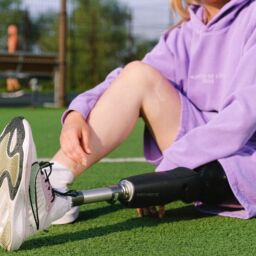INTRODUCTION
There has been a debate that whether transgender can have adoption rights or not. Transgenders have to face many problems in their daily life. In India, there are around five lakhs transgender fighting for their rights. They face discrimination every day at their homes, workplace, etc.[1] Transgender person are common people like other human beings, they also have the same rights which are given to other genders. India has a diverse community, representing all racial and ethnic backgrounds, where everyone should have equal rights and should not face any discrimination. Government is also working for the welfare of transgenders by offering welfare benefits, housing programmes, pension schemes, free operations in government and many more that the transgender should not face any social difficulties and may live a better living.
Recognition of transgender as a third gender is not a social or medical issue but a human right issue. Previously they were not even recognised as a gender but, now it is the right of every human being to choose their gender, it said in granting rights to those who identify themselves as neither male nor female.[2] The Constitution of India has provided them various rights but still one the right that is ‘Adoption’ is in question that whether a transgender can adopt a child or not.
HAVING A FAMILY IS NOT EVEN AN OPTION
In India, adoption is governed under Hindu Adoption and Maintenance Act, 1956[3] which dealt specifically with the legal process of a Hindu adult adopting children. The act specifically says that the person should have right to take in adoption but with transgender the situation is different because no such right is provided to them as there is no law which says that a transgender can have adoption. The act only says that a man or a woman can adopt a child, the term third gender is not mentioned. Transgender are fighting for their right every day, they are not even treated equally like other humans. It will take time that people will treat them equal as other human being.
The conditions which must be applied to adopt a child are-
- The person who want to adopt a child must be of sound mind as well as physical fit, financially stable and highly motivated.
- If a person is married, both the partners should give consent.
- A couple can only apply for adoption if they have a stable relationship for at least two years.
- A divorced or unmarried male can only adopt a male child, whereas a woman can adopt both a girl and a boy.
There may be a lot of reasons to adopt a child, whether it is from parent’s point of view or the children. Every human has the rights to become a parent that is why they have to adopt a child. With adoption, a child also gets a healthy environment to grow.
To start a family for transgender is not easy, they themselves face lot of discrimination. A child needs a healthy environment to grow, if the parent of the child will face socio and legal difficulties then what impact the child will have. It will affect the child mentally.[4] If this discrimination ends and people eventually change their mind and accept transgenders then only they might get the adoption rights because as such only male and female can adopt a child and the law is silent upon transgenders.
It is one of the most important rights that they are denied. If one reads the Indian constitution, one will find Article 14 which guarantees the right to equality to all Indian citizens. It states that the government, both at the state and federal levels, must not deny any person equality before the law or equal protection under the law within India’s borders14. It is one of the fundamental rights guaranteed to Indian citizens. This right serves as the foundation for any other rights that a person may seek.[5]
It is not possible to call the classification that denies the transgender community the right to adoption reasonable. There is no legitimate reason to prevent someone from adopting a child. It has a discriminatory nature. It deprives a community of the fundamental happiness that comes from having a family. Any law that violates a fundamental right is unconstitutional in India. As a result, one could argue that denying transgender people the right to adopt is unconstitutional and should be abolished.
CONCLUSION
We have been living in a society that has deprived a large portion of the people who live among us of their basic human rights. They have not received equal treatment. We have committed numerous injustices against them. However, things began to change for them when their struggle was recognised by others. When our courts and governments began to acknowledge their rights. This altered the situation and propelled us forward. We’ve still got a long way to go. In India, there are 30 million abandoned or orphaned children looking for a family.
Shruti Venkatesh summarises the injustice of not allowing adoption: “It’s unfortunate and sexist that partners don’t have legal rights over a child and that only women as single parents have the right.” The new proposed surrogacy law makes it even more difficult for lesbian, gay, bisexual, and transgender people to adopt. Many people appear to be pleased with the repeal of Section 377. Many of them believe that the queer community now has complete equality. But, in reality, there is much more work to be done, and we are still a long way from equality.
It is unjust on the part of the child, as well as the parents and community, that they are deprived of a happy life simply because the feelings of some orthodox religious groups are hurt. We’ve already seen how the transgender community’s illegal adoption has benefited and saved girls in India. They have saved girls from being sold in many states. It’s past time to recognise their efforts by granting them the right to adopt children. This will give the children happy families and the transgender community the right to have a child that they would not be able to have naturally.
Author(s) Name: Liza Singh (National University of Study and Research in Law, Ranchi)
Author(s) Name:
[1] Human Rights Campaign, ‘Understanding the Transgenders Community’ <https://www.hrc.org/resources/understanding-the-transgender-community> accessed 7 October 2021
[2] Yogita Limaye, ‘India court recognizes transgender people as third gender’ (BBC news Asia, 15 April 2014) <https://www.bbc.com/news/world-asia-india-27031180> accessed 9 October 2021
[3] Hindu Adoption and Maintenance Act 1956, s 5
[4] Mukti Heliwal, ‘On LGBTQ Adoption and Legal Reform: The Fight for The Community is Still Not Over’ <https://www.youthkiawaaz.com/2020/04/why-should-there-be-an-amendment-in-c-a-r-a-for-the-lgbt/> accessed 9 October 2021
[5] Constitution of India, Article 14
















